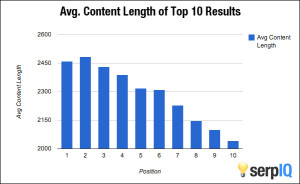Rumors Of Long-Form Content Demise Have Been Greatly Exaggerated!

It’s all too easy to ignore long-form content. With services like Twitter and Vine attracting millions of users every day, with GIFs and memes running rampant across the internet, you’d be forgiven for thinking that the art of long-form writing is dying out. I’ve been working as an SEO copywriter for a couple of years now, and when I first started I was told that all pieces that I produced, whether a blog post, and article or a press release, needed to be at least 500 words but never any more than 800.
Why, you might ask? Their argument was that it wasn’t an economical use of our time. Why write one great article of 1,000 words when, in practically the same amount of time, we could create two 500 word articles of ‘okay’ quality?
I never agreed with that idea; I’ve never seen the point in creating low to middling quality articles, even if SEO was their sole purpose.
Why Did (And Do!) People Expect Short-Form Content To Take over The Digital World?
I can’t really blame those who do prefer shorter articles and blog posts; sometimes, they can be absolutely fantastic. Of course, there is a range of reasons why shorter content is often the norm for many personal bloggers and businesses. For example;
- They can provide information in a short, concise way;
- The reader doesn’t need to scroll through a lot of content to find the one part that is relevant to them;
- Shorter content is more easily-readable on a smaller screen, such as on an iPhone or Android;
- People’s attention spans have definitely shrivelled over the past few years; I remember reading a study which said that humans now have a shorter attention span than goldfish;
- People are becoming less and less literate, particularly here in the UK; meaning that shorter and simpler content is more accessible to a wider audience;
- People want shorter, snappier content to appeal to them over social media;
- People are busier; fewer and fewer of us have the time to sit down and read a length article;
With all these real reasons, why wouldn’t short-form be the logical direction that online content is going to take? Who wants to scroll through a 2,000-word article on a iPhone screen on the train? What about the question of quality? Of search engine optimisation?
These are the questions that have been in discussion for some time amongst blogging and digital marketing circles, with some advertising ‘experts’ moving in favour of shorter-content whilst the best SEO copywriters, creators and personal bloggers (go team!) are mostly in favour of longer, more interesting material and writing on the most informative topics.
What Is Long-Form Content?
As with many things online, the chances are you’ll be able to find dozens of different definitions of long-form text. A lot of people have started to believe that, as everything else is getting shorter and shorter, the art of longer-writing is getting more compact as well. I’ve heard people say that the 500-word articles of the past are long pieces of writing, particularly when compared to the extreme limitations of six seconds, or 140 characters!
By that logic, even Facebook posts could be considered long-writing, but then where does that leave the 2,000-word blog posts that personal bloggers spend hours upon hours crafting? And even then, what about those top-X lists which dominate a lot of modern content creation? Split between multiple pages to drive views, with each page only hosting two-hundred or so words; do they count as long-form writing, or are they just linked short content?
The Ideal Length Of Long-Form Writing
Before I get started, I’d like to point out that these are just my personal guidelines. It’s absolutely essential that you treat every piece of content that you create as a unique entity; you can’t afford to apply the same standards across the board, as that will often result in topics which require in-depth knowledge to be cut down and quickly-coverable topics to be repeated or attached to irrelevant information.
Personally, I tend to think that around 1,600 words is a good length for something to be considered long-content. Thinking back to my student days, I’d probably argue the old 10% rule, meaning that 1,440 is probably the minimum length for longer writing. In terms of maximum length, I wouldn’t really say there is one, but you should still consider the article’s readability. Don’t stuff lots of content into an article, but don’t repeat yourself either.
Remember that you’re writing for people, not for the search engine; you’re writing with an express purpose in mind (most of the time), so keep that at the forefront of your writing at all times. Take this piece for example; I’m trying to be informative, helpful and to make a point about the advantages of longer writing. If I was writing for my personal literary blog, it would be a lot more complex, and definitely on a different topic.
So, what’s the answer? Typically, longer-form content is a piece of writing that exceeds 1,400 words, but that’s not all!
The Format Of Long-Form Writing
In my experience, because they are so text heavy, longer pieces of writing require other forms of medium in order to break them up. It’s not just a matter of readability, however, but other mediums really can add great advantages to a piece of writing. Embedded videos from YouTube, images and detailed infographics can all add value to content.
One great way of adding video content to articles, which doesn’t add too much time to the content creation process, is simply to create a slightly shorter version designed for speech. That way, you can provide an alternative for those on the move or who prefer to listen rather than read. It can also be a great way to increase a piece of writing’s visibility, particularly over social media.
Infographics are a fantastic addition to any blog. They can be a great way of providing specific information, particularly statistics. Not only are they easily shareable, but they provide real advantages to content quality and can even help with SEO! There are a range of great, free infographic creation platforms out there, including Canva, so even if you don’t have much design experience you can start to make them quickly and easily.
Why Do I Need To Create Longer Content?
This is the part of the article where I try to convince you that you need to be creating content on a much larger scale, particularly if you’re a personal blogger and your content is the only thing your platform is providing.
The so-called ‘death’ of long content was never really going to happen; the internet is too big, too convoluted and too contrary to allow any kind of general statement like that to remain true. Now, a great number of digital marketers, SEO experts and bloggers are realising that extended content if great for search engines and users too!
Express Your Personality!
Longer pieces of writing provide you the opportunity to truly express your own unique personality. This is absolutely essential for any personal bloggers who want to grow their readership, as most of your blog’s appeal will rest on your own personality and online charisma. It can be almost impossible to include a real glimpse of your personality when you’re wrestling with a limited word count, but the longer your content is, the more unique you can make it.
In-Depth Information!
If you’re writing about a particular topic, you can go into much more detail than otherwise possible. This can dramatically increase a post’s value to a reader and ensure that they find the information they’re looking for. Shallow articles are a major issue at the moment, and one of the main reasons that writers fail when it comes to engaging and expanding their blog.
With extended articles, you can really get to grips with a topic and ensure that your user leaves your site feeling completely satisfied with their interaction.
It Takes… Longer To Write?
You’ll probably think that this is a bad thing, seeing as you want to churn out material as quickly as possible, but that’s definitely not the way to approach personal blogging or content marketing. The simple fact remains that articles which are given the correct length of time turn out better – that’s just a fact. The more time you spend on a piece, the more in-depth you can go and the quality of your writing will increase as well.
I know for a fact that proofreading is often seen as an added bonus in the marketing world, whereas it should be an integral part of any content creation. Spell-checking is essential, and ensuring that your sentences are all designed to inform, engage and drive the reader forward is of paramount importance.
Of course, the longer the content is, the more engaging and informative you will need to be. However, you can balance this with the amount of time the user then spends on your site and how satisfied they are when they leave.
Extended Content: How Can It Work Alongside Social Media?
Here’s the thing; one of social media’s greatest benefits for businesses and bloggers is that it can be used to promote certain pieces of writing, or other forms of content, and remind people about the content you’re creating. Not only can it be used to interact with your readers, but it can also be essential when it comes to building a community around your blog or business.
For all that the doomsayers have predicted the rise of shorter content across social sites and platforms, longer content still seems to enjoy a much more powerful social presence than ever before. The added value to be found in longer content makes it much more likely to be shared across social media; so long as it is combined with a snappy title and an attractive image.
Longer text creates more fulfilling experiences for viewers and is more likely to receive higher numbers of retweets, likes and favourites across the entire social spectrum.
Is Longer Content Better For SEO?
Finally, we get to the stage that you’re probably most interested in. Does longer content have any real, practical effect on search engine optimisation, and is it really worth the time to create? I’d say that the reasons I’ve given above make it worth the extra time already, but now we’re going to turn our attention to the former.
Firstly, Google’s algorithms are a complete and utter mystery – everyone knows that, and the search engine mammoth definitely isn’t going to share that information any time soon. I might not have any inside knowledge, but I’m a big believer in content quality as a ranking factor.
Back in 2012, serpIQ performed an in-depth study regarding content length, addressing on-page text which ranked, for more than 20,00 keywords. One of the most interesting things that they discovered was that, on average, ‘10th position pages have 400 words less than first position pages.’ I don’t need to tell you that this really provides a lot of fuel to the arguments in favour of longer content over shorter for search engine optimisation.
As the graph shows, the average text length for those in the top 10 positions was more than 2,000. Those that took the top spot on a regular basis had more than 2,450 word on their pages. Now, if that doesn’t promote the use of longer writing over shorter alternatives, I don’t know what will!
A Hint From Google Themselves?
The original creator of the Panda algorithm, which focused on promoting high-quality content over shallow articles, Pandu Nayak, once said that: “Users often turn to Google to answer a quick question, but research suggests that up to 10% of users’ daily information needs involve learning about a broad topic. That’s why today we’re introducing new search results to help users find in-depth articles.”
That’s a massive hint which all kinds of content creators need to be pouncing on. However, amongst the ever-growing deluge of crap on the internet, it seems to have gone relatively unnoticed.
Long-Form Writing, And A Little Thing Called Back-Linking!
Backlinks are one of the most valuable things in the digital world. When linked to from a reliable source, your site will gain authority and rise in the search ranking, as well as catch traffic from that external website. The better your writing is, the more likely it is to be linked to, shared and inspire other people to write and create their own! This can be absolutely fantastic when it comes to SEO and building an online reputation as a producer of high-quality content.
Long Writing Is A Long Process – Take Your Time!
You’re probably already raring to get back to your word document and start to reel off high-quality, informative material, but wait! Remember that one of the most important things in creating high-quality content is time. If you rush off and hammer a few thousand words in the regular amount of time it’d take you to create a blog, you’re likely going to end up with low-quality, shallow writing. Give all of your topics, and all of your posts, the time and affection that you want to give your audience. If you really want to create great writing, you can’t rush it.
SEO isn’t a race either, and don’t think that just because you create a single piece of informative, long-form content, you’ll immediately dominate your blogging niche. Content marketing is slow, long-lasting and evergreen, and you need to be more like the proverbial, white-hat wearing tortoise than the speedy, black-hat hare.
In the end, the best quality content will always trump shallow, uninformative pieces of writing; it just so happens that the best and most useful text is normally written in long-form.


